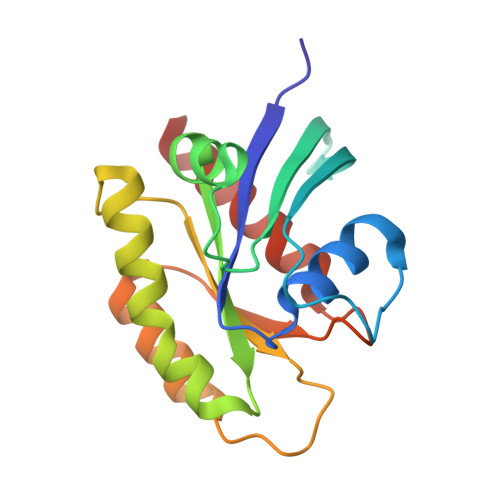Allosteric Regulation of Switch-II Domain Controls KRAS Oncogenicity.
Yang, M.H., Tran, T.H., Hunt, B., Agnor, R., Johnson, C.W., Shui, B., Waybright, T.J., Nowak, J.A., Stephen, A.G., Simanshu, D.K., Haigis, K.M.(2023) Cancer Res 83: 3176-3183
- PubMed: 37556505
- DOI: https://doi.org/10.1158/0008-5472.CAN-22-3210
- Primary Citation of Related Structures:
6WS2, 6WS4, 8STM, 8STN - PubMed Abstract:
RAS proteins are GTPases that regulate a wide range of cellular processes. RAS activity is dependent on its nucleotide-binding status, which is modulated by guanine nucleotide exchange factors (GEF) and GTPase-activating proteins (GAP). KRAS can be acetylated at lysine 104 (K104), and an acetylation-mimetic mutation of K104 to glutamine (K104Q) attenuates the in vitro-transforming capacity of oncogenic KRAS by interrupting GEF-induced nucleotide exchange. To assess the effect of this mutation in vivo, we used CRISPR-Cas9 to generate mouse models carrying the K104Q point mutation in wild-type and conditional KrasLSL-G12D alleles. Homozygous animals for K104Q were viable, fertile, and arose at the expected Mendelian frequency, indicating that K104Q is not a complete loss-of-function mutation. Consistent with our previous findings from in vitro studies, however, the oncogenic activity of KRASG12D was significantly attenuated by mutation at K104. Biochemical and structural analysis indicated that the G12D and K104Q mutations cooperate to suppress GEF-mediated nucleotide exchange, explaining the preferential effect of K104Q on oncogenic KRAS. Furthermore, K104 functioned in an allosteric network with M72, R73, and G75 on the α2 helix of the switch-II region. Intriguingly, point mutation of glycine 75 to alanine (G75A) also showed a strong negative regulatory effect on KRASG12D. These data demonstrate that lysine at position 104 is critical for the full oncogenic activity of mutant KRAS and suggest that modulating the sites in its allosteric network may provide a unique therapeutic approach in cancers expressing mutant KRAS. An allosteric network formed by interaction between lysine 104 and residues in the switch-II domain is required for KRAS oncogenicity, which could be exploited for developing inhibitors of the activated oncoprotein.
- Department of Cancer Biology, Dana-Farber Cancer Institute, Boston, Massachusetts.
Organizational Affiliation:


















